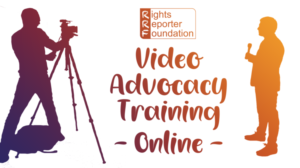 Our partner The Rights Reporter Foundation (Drugreporter) organises two free trainings on media engagement and video advocacy.
Our partner The Rights Reporter Foundation (Drugreporter) organises two free trainings on media engagement and video advocacy.
Video as a tool for change is becoming more and more popular among activists. Since 2007, the video advocacy team of the Rights Reporter Foundation has been producing online advocacy videos that translate the often-complicated issues of human rights, drug policy reform, and harm reduction into easily understandable and interesting video pieces. These videos not only inform, but motivate and mobilise for direct action for change.
It is the organization’s strategic goal to train and enable activists to effectively communicate in the language of video, to influence people’s thinking and public policies, and to build vibrant and tolerant communities that value human rights. Since 2009, Drugreporter has held video advocacy training for more than a hundred activists around the world. Due to the COVID-19 pandemic, it was decided to hold the next trainings online.
Who can apply?
The RRF is ready to train 15 activists from around the world, who would like to use video in their harm reduction and drug policy reform advocacy work. The applicant must work in the field of harm reduction and drug policy reform advocacy, or be closely affiliated with such an organisation, and the person applying must meet the following requirements:
- Understanding of harm reduction/drug policy reform and its human rights dimensions;
- Time/capacity to produce videos (preferably not executives or senior staff members who have no time/capacity to make movies);
- Fluency in English;
- Basic computer and Internet skills;
- Good communication skills (ability to make reports, interviews);
- Good working relationship with harm reduction/drug policy organisations from the country;
- Commitment to make videos about drug policy/harm reduction in the longer term.
- Participants should also have some sort of video recording device that they will use at the training. It can be a photo or video camera or even a smartphone.
What will you learn at the training?
The training consists of 3 modules:
Module 1 – Pre-production (December 8, 2021 half-day): What is video advocacy and how to plan and prepare for your videos. You will study examples of the RRF’s and other NGO’s work, the definition of video advocacy, its strengths and weaknesses, how to build your video advocacy strategy, planning your budget and fundraising, storytelling, what to pay attention to with regards security and consent, and more.
Module 2 – Production (December 8, 2021 half-day): What is the necessary equipment, how to operate your camera, how to make interviews and record your story. You will have hands-on practice with your own camera or phone and you can practice in real interview situations.
After this module, participants will have a week to practice filming and editing.
Module 3 – Post-production (December 16, 2021): How to edit your own film and get it out to your target audience. You will learn all the necessary basic editing skills to put together your important story. This module consists of pre-recorded tutorials on editing, including on using Adobe Premiere Pro CC (as well as a list of existing online tutorials on editing with all the other major editing programs). Participants will then have a week to practice editing at home, and then the organization will have a Zoom meeting on December 16, 2021 to discuss any questions. The trainer will be available for further one-on-one consultation sessions as well.
Financing and cooperation
The training is being offered free of charge for participants, thanks to the support of the “Harm Reduction Consortium”, financed by the Robert Carr Fund for civil society networks. This training is organised by the Rights Reporter Foundation (RFF), in close cooperation with the International Drug Policy Consortium (IDPC).
How to apply?
Fill out this online application form by November 22, 2021 for the video advocacy training.



